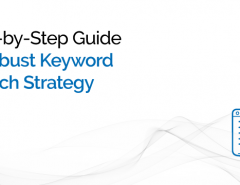Keyword analysis is the initial step of determining the perfect word/ phrase. It is undoubtedly one of the most fundamental SEO factors to identify optimization opportunities for a website. Keywords affect both SEO (search engine optimization) and SEA (search engine advertising).
Researching about the relevant keywords with proper keyword analysis tool is a worthy act before beginning any SEO activity or before the creation of an SEA campaign. This evaluation process makes the marketers aware of the competition level and enables them to anticipate the expected results also.
What are Keywords?
Keywords are terms and relevant responses to the “search queries” entered into the search engines. They are those essential elements of any written content/blogs or articles published online that define what content is all about.
Keywords fall into three different categories – primary, secondary and tertiary. For on-page SEO, primary keywords are more meaningful. They’re essential for purposes of search engine optimization as they’re simple words or phrases related to all the images, video, copy, etc. describing the web page and helping the browsers to locate the appropriate site conveniently.
It is used at the beginning of any other keyword category and appears in the site’s title, and also in the domain name. Such types are found in the first sentence of the page too.
A secondary keyword appears just after the primary keyword. But it is not that important for any site regarding SEO. Nevertheless, a secondary keyword heightens the chances of attracting additional visitors to a website.
Next in the line is the tertiary keyword, it is adopted just behind the secondary keywords in keyword meta tags.

Understanding keyword and its importance
Keywords are relevant because they act as an anchor to hold between what people are searching for and the type of content that provides to fill the need. These targeted words help a page to rank higher on search engines and drive organic traffic to the site from the search engine result pages (SERPs).
Choosing the right keyword thus matters a lot. Choice of keywords determines what kind of traffic one can receive and this purpose is served with the process of keyword analysis.
Ideally, keyword research is mainly the master plan for the online marketing efforts, driving every decision one takes. Analyzing keywords enable the SEO marketers to find out the perfect target words for a page. This process further lets the content marketing team understand which content to advertise. Eventually, the CRO funnel gets wider.
Why keyword analysis is more important than you think
Before, understanding the importance of keyword analysis, at the outset, it is necessary to know about the term SEO or search engine optimization.
In this knowledge age, the internet is one of the essential channels to connect to a wider range of the global population. According to a recent survey, the internet has 50% penetration worldwide. Therefore, an online marketer has the scope of sharing his brand information to half of the world’s population online. But, to reach to such a large client base, one must have a clear conception of tools and technologies – how to make the information available to them.
With several advanced online marketing techniques, the process of delivering knowledge has become easy. Among all other such strategies, SEO marketing works wonder for all.
To determine the best keyword, an online businessperson can use keyword analysis tool. Such tools can make the entire process of keyword research more efficient. A marketer identifies which relevant catch words would lead the site, which ones are used by the competitors to drive traffic.
Appropriate use of keywords rules SEO marketing
SEO keyword research is vital to boost sales and the ROI. With the existence of different digital marketing techniques all around, keyword analysis is favored by all online marketers globally for greater SEO marketing results.
A content creator focuses on finding out appropriate and useful keywords for a page. They conduct SEO keyword research for a better chance of appearing on top of search results.
Hence, keyword research is performed to identify factors: the amount of conversion, traffic drive, click through rates and search engine result page(SERP) spots.

With proper keyword research practice a digital marketer can:
- Understand the competition level on their search keywords or phrases.
- Analyze negative keywords and decide which ones to
- View the current performance of keywords or phrases.
- Find out the volume of a searched keyword or phrase.
- Calculate target cost-per-click (CPC), cost-per-action (CPA) or expected revenue.
By using practical keyword analysis tools one can thus determine popular niches, find related markets, and gradually rank well in search engines results.
However, keyword research isn’t just about Search Engine Optimization. It’s the very basis of all those digital marketing practices used for reaching out to the target customers. SEO keyword research connects to the way where organic search traffic comes from and decides what the organization is famous for.
Process for an efficient keyword analysis
To create content that performs well organically and drives visitors to a site, one needs to understand the needs of those visitors.
A survey will enable marketers to find out the consumer buying cycle, which are:
- Recognizing a need
- Searching relevant information for the specific product
- Evaluation of alternatives if initial search does not satisfy
- Decide to purchase the chosen product
- Buy the product
- Post-buying evaluation
A content creator should act according to the general psychology of each user, for example, what kind of language they use and what type of content they seek.
Audience’s happiness is the cornerstone of the success of any online page; people must formulate keywords to satisfy the needs of the readers.
People can attain this goal just by thinking like the customers. One can join forums and community groups in social networking sites to find out what the target audience is doing and finally formulate their keyword.

Additionally, each marketer should possess a clear understanding of what type of keywords clicks: Long-tail keywords or short tail keywords. Long-tail keywords guide search engines. They are the titles or subtitles in the content that gives rankings boost. On the other hand, short tail keywords are found throughout the body of the blog/article. Both are important in their perspective.
To conclude
The primary focus of any business personnel is to satisfy his target client-base. It is the need of the hour to accept that researching and using the ideal keywords boost SEO, content marketing, CRO, and also social media recognition.
Although, keyword research is a routine task, yet it’s still necessary so that one can reach to his customers worldwide. But, one must continue to survey – Google and other search engines program over 200 ranking factors to determine a site’s search ranking. These search engines devise various algorithms and web crawlers to understand the context of keywords. Thus, people must understand these algorithms factors matter a lot and decide the perfect catchword.




